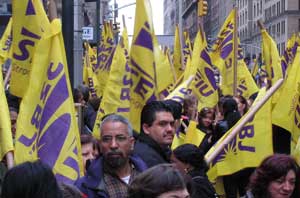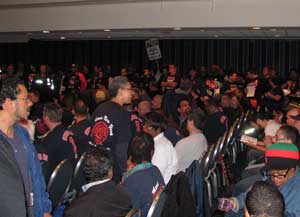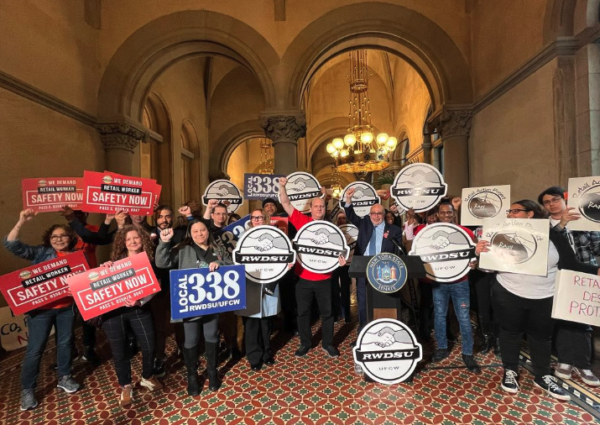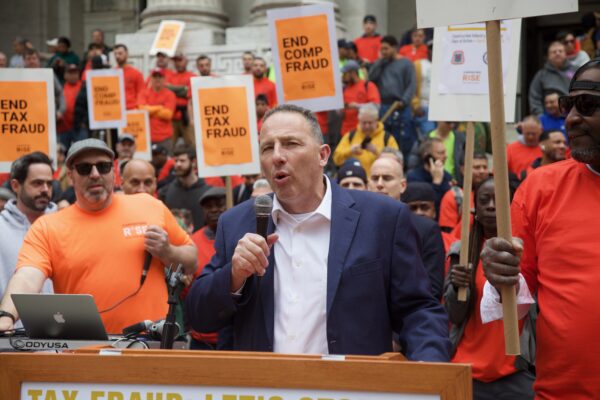November 16, 2011
By Marc Bussanich, LaborPress City Reporter
Kwame Patterson, Senior Coordinator, SEIU Local 32BJ, said “historically the union has held contract negotiations with the Realty Advisory Board (RAB) at the Sheraton Hotel” on 7th Avenue in Manhattan. But joining Local 32BJ this time was TWU Local 100, which started its negotiations with the MTA on the same day. Perhaps RAB and the MTA didn’t communicate with each other they’d be negotiating on the same day at the same hotel, prompting some union members to joke that the two different executive teams probably couldn’t exit fast enough when they saw the union density.
Both unions staged a kick-off rally across the street from the Sheraton where union leaders and their allies spoke to a joint Local 32BJ and TWU Local 100 union gathering. Local 32BJ represents 22,000 workers in the commercial building sector who work as porters, maintenance crew and cleaners.
The local submitted its proposal to RAB officials earlier in the day, which the RAB “accepted stoically,” said Michael Fishman, Local 32BJ’s President. Patterson said the new contract proposal calls “for modest wage increases and maintaining affordable health care” as the average salary for the office workers is $47,000.“The real estate industry has proven resilient despite troubles in the overall economy, but raising a family on less than $50,000 is very difficult for our members. We are asking not to get rich, but to secure a contract that sustains families,” said Patterson.
Héctor Figueroa, Local 32BJ’s Secretary-Treasurer, noted that despite the industry’s profitability, he expects tough negotiations over the next two months. “The industry has been saying both publicly and at trade conferences that they are and will remain profitable for some time,” said Figueroa. He cited the work of Hugh Kelly, Professor of Real Estate at NYU, who has shown that the city’s real estate industry is “very profitable” based on property values and rents collected.
Mike Fishman, President for Local 32BJ, said that just last week at the Bloomberg Commercial Real Estate conference some of the city’s biggest building owners and developers told the audience that “things will be great [for the industry] for the next two decades.” Despite the optimistic forecast by the owners, Fishman also believes negotiations will go down to the wire because building owners “always cry poverty during negotiations with the union.”
Before going inside to make TWU Local 100’s case for an equitable contract before the MTA Executive Board, President John Samuelsen told LaborPress that he is “committed not to sell his members down the river.”
Once inside the hotel, Samuelsen and Joseph Lhota, the new MTA President, greeted and seemed to speak amicably towards each other. After being introduced by Samuelsen, Lhota told the packed room of TWU workers that he was appreciative of the workers’ hard work, especially during Hurricane Irene.
After the accolades, however, he informed the transit workers that the negotiations are occurring in the context of a weak economy. “Our goal is to work with you to make sure you’re fully compensated, but we have to account for a dwindling budget.” But, he quickly noted, “I’m confident we’ll be successful in reaching a new collective bargaining agreement.”
 Before Samuelsen made his presentation on the general contract demands, he told the packed room that he knows he and the bargaining committee “will have serious disagreements” with Lhota as the negotiations commence, an indication that TWU may not be able to attain all of its demands.
Before Samuelsen made his presentation on the general contract demands, he told the packed room that he knows he and the bargaining committee “will have serious disagreements” with Lhota as the negotiations commence, an indication that TWU may not be able to attain all of its demands.
A few of the demands include no layoffs, fair wage increases and Cuomo’s signature on the Transit Lock Box Bill, which Cuomo hasn’t signed since Local 100 publicly asked him to do on the Transit Day of Action in September at City Hall. The Transit Lock Bill would prevent the state from using monies dedicated to transit to fill in any budget shortfalls.
Samuelsen said MTA executives have repeatedly blamed the agency’s fiscal woes on labor costs, but “the real culprit is the out-of-control debt service,” which now stands at roughly $30 billion. The agency also has an $8 billion gap in its capital program, “which is essential for good repairs.” According to Samuelsen, labor costs have declined from 72.3 percent of the agency’s budget in 2008 to 53.9% in 2011. “The agency blames the woes on labor costs, but that’s cover for sidestepping the debt service.”
While Samuelsen welcomes the change in MTA leadership, he didn’t mince words when he told his members, “We will not jeopardize our families’ futures because Albany or City Hall under-funds public transit.”


